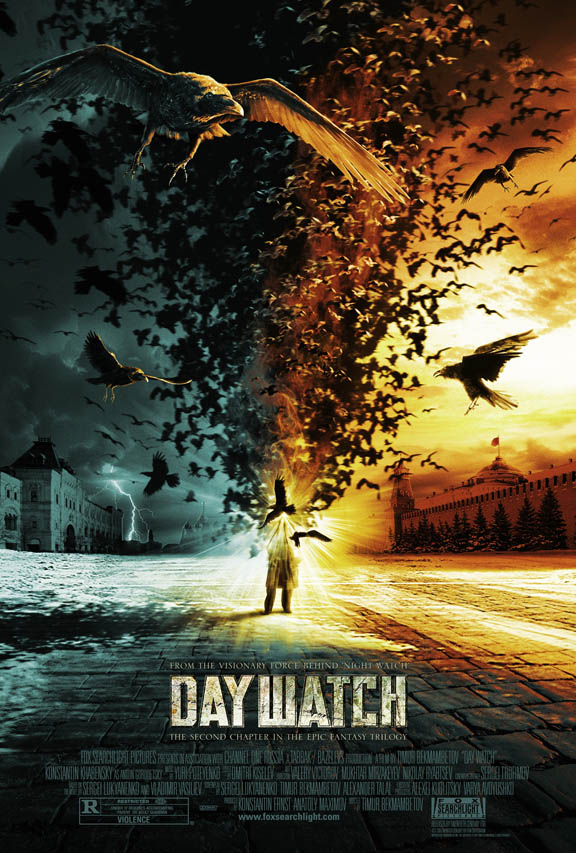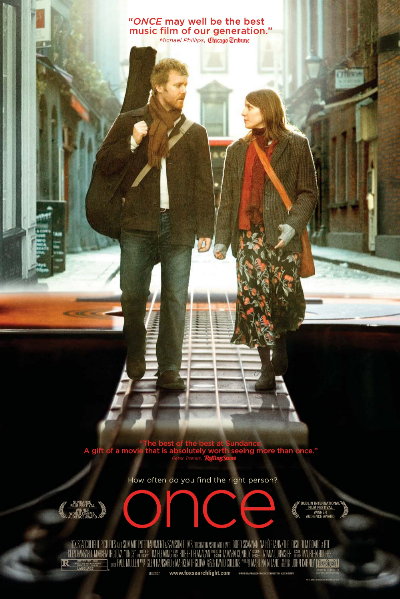 ONCE (2007, directed by Joe Carney, 85 minutes, Ireland)
ONCE (2007, directed by Joe Carney, 85 minutes, Ireland)
DAYWATCH (2006, directed by Timur Bekmambetov, 132 minutes, Russia)
BY DAN BUSKIRK FILM CRITIC
As a viewer who has successfully defended himself against many cloying romantic comedies, I was pleased and surprised that I found myself defenseless against the acclaimed Irish musical romance saddled with the forgettable title Once. It’s no shock that audiences have been swooning for this Sundance award-winner, as it evokes the experience of frustrated love with a dreamy directness while throwing in a bunch of heartfelt musical performances from an empathetic cast. Any film that hits this many crowd-pleasing notes and still comes off fresh and unpredictable is sure to quiet grouches complaining about rising admission prices and the stress of leaving their houses.
Writer/director Joe Carney must have known just how to make his busking lead, played by Glen Hansard, shine. Carney was the original bass player in Hansard’s band The Frames, and it is solely on the performances of the red-headed Hansard and his disarming co-star, Czech recording artist Marketa Irglova, that the film’s slight setup not only succeeds but soars. Hansard plays an unnamed street musician who only uncorks his originals at night when the crowds stop listening. That is, except for Czech immigrant Irglova, who sees something special about Guy’s songs and drags him over to an instrument store so she can accompany him on piano. It’s this Meet Cute scene that the film will be remembered for, when Irglova, dragging her a broken vacuum cleaner behind her like a tired old dog, sits down at the piano’s stool and adds a romantic dimension to Hansard’s gravelly soulful shouting. What is love but transcending our private loneliness, and hearing these two amiable strangers find a personal connection and a perfect voice to harmonize with gives the scene a visceral boost; you can feel their hearts surge as they fumble their way to the chorus.
As musicians know timing is everything, and just as you start expecting a romance to bloom we find out that despite the growing affection between them neither is in the position to throw themselves into the other’s arms. Instead they put their energies into an upcoming studio session for Joe’s backlog of earnest relationship songs, and watch them each performed by our two thwarted lovers, each song telling us more about the state of their emotions than they’d be otherwise willing to admit.
backlog of earnest relationship songs, and watch them each performed by our two thwarted lovers, each song telling us more about the state of their emotions than they’d be otherwise willing to admit.
Although the tunes are done in that James Blunt/”sensitive guy with guitar” style the can easily gets overcooked, the naturalistic performances easily sell each scene. The sleight-of-hand that allows the characters to burst into song is pretty clever as well, especially in a beautiful unbroken shot of Irglova (who was 17 during the shooting, although she plays it like she’s in her mid-20s) walking through town with her headphones on, hearing the music in her head while she tries out some of her new lyrics to one of Hansard’s melodies.
This all works so beautifully there is a temptation to oversell Once, and its ambitions and scale are so restrained it is not a film you want to build up too much by over-recommending. Perhaps this hesitation stems from the fact that the film’s bright musical soul is dampened by some of the ugliest digital camerawork I’ve yet seen on the big screen. I’ve stopped being such a old fart in the digital vs. film debate, appreciating that many films would never get made if they had to incur the cost of film stock, but that’s no excuse for getting this casual about how your film looks, allowing the majority of the frame to dissolve into a murky stew the color of bilge water.
That murkiness is much more fittingly displayed in the new Russian sci-film Daywatch, the second installment in the Nightwatch trilogy. If you are not already on board, the film spends a good 90 seconds explaining how right under our noses, supernatural beings — The Light One and The Dark Ones — have been engaged in an unsteady truce to balance the forces of good and evil on Earth. Modern day Moscow is the perfect setting for this damp and weathered tale, the city’s back alleys and cramped apartments already seeming slightly alien and made even more so by adding CGI spiders and smoky slow-mo alternate dimensions. As if seeing a Russian Matrix knock-off isn’t “alternate dimension” enough.
While the film is full of fantastic distractions, a car that burns rubber scaling the side of a government office building, horses that charge through brick bunker walls and a ring that is wriggled off a finger just as a Ferris wheel wriggles off its mount, none of this upstages the building feelings between our sad eyed detective Anton (Konstantin Khabensky) and his psychically-gifted partner Svetlana (Mariya Poroshina). When Anton switches bodies with a female colleague, he’s able to investigate Svetlana’s feelings for him in a wonderful, gender-bending side-trip among the mayhem. Although Daywatch’s exotic setting may you feel like you’re seeing something deeper than a typical sci-fi blockbuster (which I’m not sure is actually true) its overly-tidy climax wrapped things up so tight the I was left feeling cheated out of a second-act cliffhanger. It’s a different kind of Russian downer, the disappointment of realizing that they may have learned Hollywood’s lessons too well.
